Goldfish Growth: Complete Guide with Chart
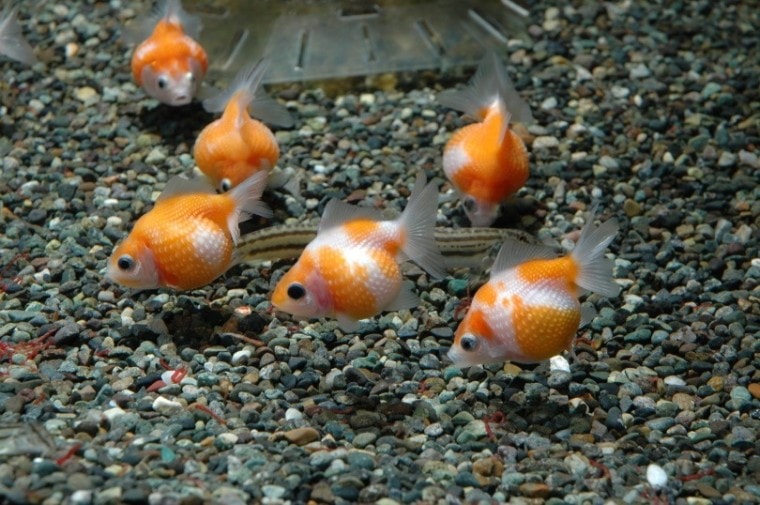
Growth in goldfish, like any animal, is dependent on its nutrition and living conditions. The single best thing you can do is to pay attention to both of them. The former supplies the raw materials your fish need to grow and develop. The latter determines whether it will conserve or redirect its resources to support survival or growth.
It’s essential to remember that the point of life is to live long enough to pass your genes on to the next generation. If things are uncertain, an organism will focus on growth instead of reproduction. That means young or flowers and seeds. It’s something that winegrowers grasp. Make the vine work for nutrition, and it will concentrate its resources on grapes instead of foliage.

How Big Do Goldfish Grow?
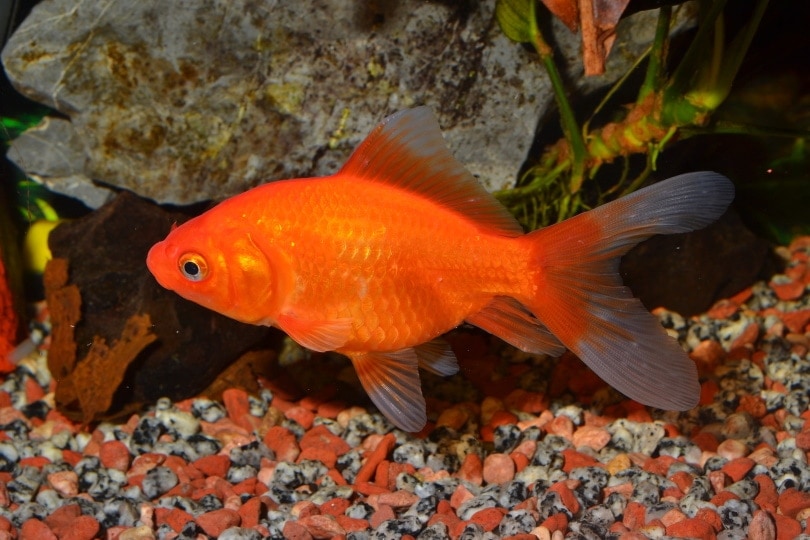
Goldfish can get anywhere from 2 inches to well over 10 inches in a pond. They can even grow larger in the wild, with unlimited resources and space. They grow rapidly from fry to bigger fish in the first few months. The driving force is survival. It’s easier to evade predators—or get food—at this size. However, there are a lot of variables.
Goldfish need about 29% protein and 12% fat in their diet for optimal growth. Ideally, the energy:protein ratio is 9.7 grams:1 gram. Remember that they are opportunistic omnivores. They will eat a wide selection of foods, from vegetation to insects to invertebrates. The other thing to take into account is the fish’s variety.
Fancy goldfish, such as Fantails and Veiltails might not get as big as your average everyday fish. The reason is the former dedicates some of its nutrition to fin development or other body structures. Fins are a hindrance to them in the wild. However, the chances are they are kept in aquariums instead of other water bodies. Therefore, your experience may differ from the chart below.
Goldfish Growth Chart
| Age | Slim-Bodied Goldfish | Fancy Goldfish |
| 1 month | 0.9 inches | 0.9 inches |
| 6 months | 2 inches | 1.5 inches |
| 12 months | 3.25 inches | 2.75 inches |
| 18 months | 4.5 inches | 3.5 inches |
| 2 years | 5.25 inches | 4 inches |
| 2.5 years | 6 inches | 4.5 inches |
| 3 years | 6.5 inches | 5 inches |
| 3.5 years | 7 inches | 5.5 inches |
| 4 years | 7.75 inches | 6 inches |
| 4.5 years | 8.5 inches | 6.5 inches |
| 5 years | 9.25 inches | 7 inches |
| 5.5 years | 10 inches | 7.25 inches |
| 6 years | 10.75 inches | 7.5 inches |
| 6.5 years | 11.5 inches | 7.75 inches |
| 7 years | 12 inches | 8 inches |
Source: http://www.bycaitlin.com/goldfish-and-koi.html

How Fast Do Baby Goldfish Grow?
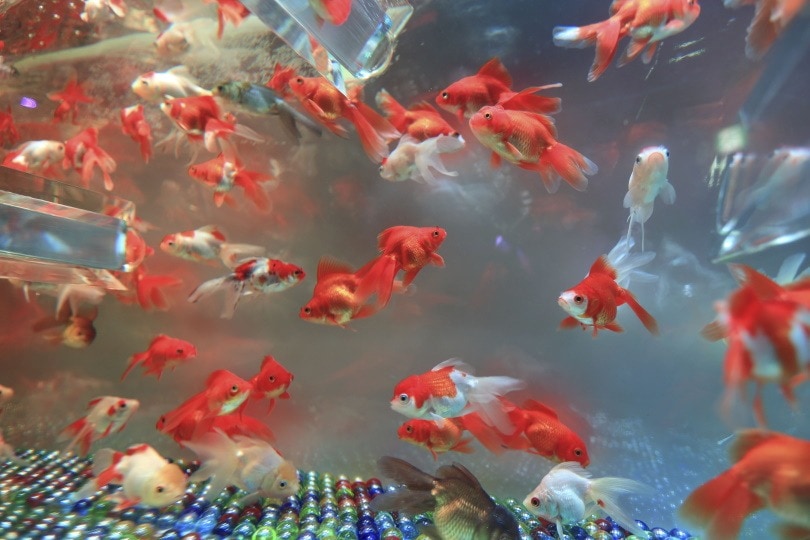
Surprisingly, goldfish can’t eat right after hatching. Instead, they will hide in vegetation or other safe places until their mouths develop. After they start swimming, then growth proceeds quickly, with significant gains during the first weeks of life. Again, it’s all about survival and avoiding predators.
Week 1
On day one, the goldfish fry will measure about 0.2 inches or about the size of a grain of rice. By the end of the week, they will almost have doubled in size to about 0.4 inches.
Week 2
The growth spurt continues into week 2. Again, the fry will nearly double to about 0.6 inches. They’ll also start to look more like fish, with fin development underway.
Week 3
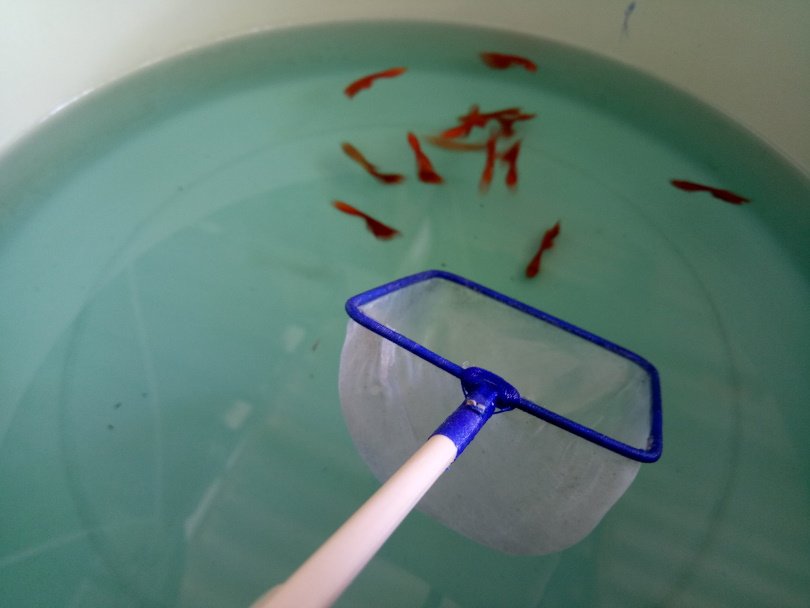
Things are still moving quickly during week 3. The goldfish are approaching 0.8 inches long at this point. Fin development is evident, which helps them get around and feed.
Week 4
You may notice that the growth rate has slowed slightly as the goldfish get closer to maturity. They may measure about 0.9 inches, depending on what you’ve been feeding them.
Week 5
The goldfish will have a full set of fins now. Growth is still slowing down, with no substantial differences in size.
Week 6
Your goldfish should be around 1 inch long now. While they aren’t gaining a lot in size, much is going on within them to complete their development.
Week 7
The growth rate is proceeding at about 10–15% per week to about 1.1 inches. They are still juveniles, with another growth spurt on the way.
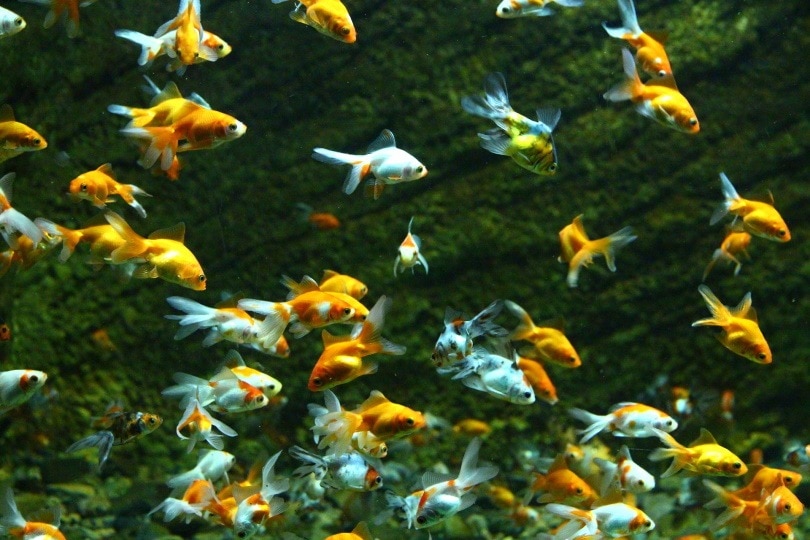
Week 8
The goldfish are just over 60% of their first-year size, measuring about 1.25 inches. During these first weeks, they were growing almost 30% on average per week.
Week 9
You’ll see a slight increase in size and form as your goldfish mature. Providing adequate protein is imperative. Animal sources, such as shrimp, are excellent additions to their diet.
After Week 9
Your goldfish will reach about 2 inches in 6 months. As long as it has adequate nutritional support, it’ll reach over 3 inches by the end of its first year.

How to Avoid Stunting Your Goldfish
One concern you may hear about is the risk of stunted growth. Bear in mind that genetics have a lot to do with your goldfish’s potential size. No matter what you do, its DNA determines its length. While the fish may look stunted, it might just be what Nature intended.
Other factors also play a role, which you can control. A lot of it is common sense. It’s worth noting that goldfish are vulnerable during the first months of life. Even though they are tolerant as adults, that’s not necessarily the case with juveniles. Let’s discuss which elements matter most to support your goldfish’s healthy growth.
Tank Size
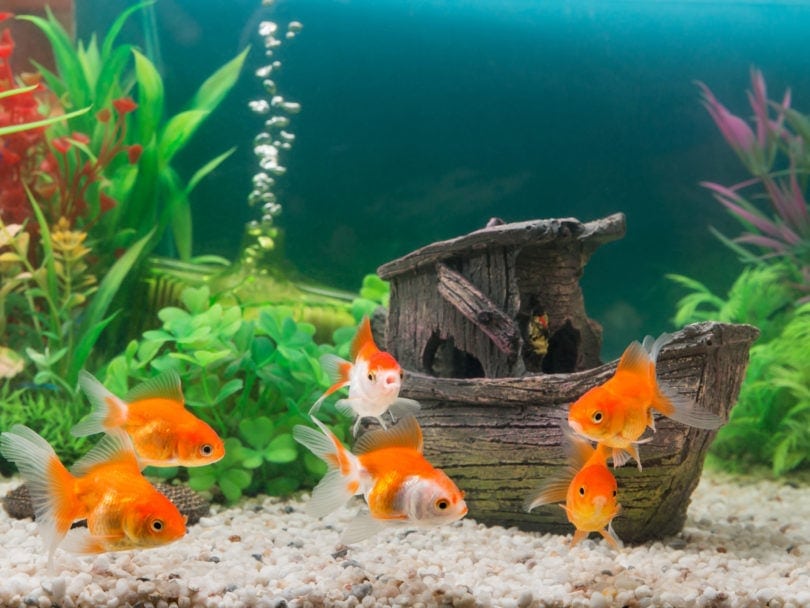
We’ll address the elephant in the room first. Goldfish bowls, often less than 1 gallon, are not a healthy living environment for your fish. Some jurisdictions and countries have gone so far as to call them cruel. Let’s consider it from a logical perspective.
Goldfish are messy animals. There’s no getting around that fact. Their bodies support rapid metabolism and, thus, waste. A small tank means that you’ll have to clean it more often. Every time you change the water, it stresses the fish and leaves them vulnerable to disease.
We recommend at least a 20-gallon tank for several reasons. First, the large amount of water will help ensure that the conditions stay stable, which is ideal for any fish. Second, it’ll cut down on your maintenance significantly. Finally, you need to consider the goldfish’s adult size. A fish that can potentially get 12 inches long has to have space to swim.
Housing a goldfish isn’t as simple as buying a bowl. If you’re a new or experienced goldfish keeper who wants to get the setup right for your goldfish family, check out the best-selling book, The Truth About Goldfish, on Amazon.
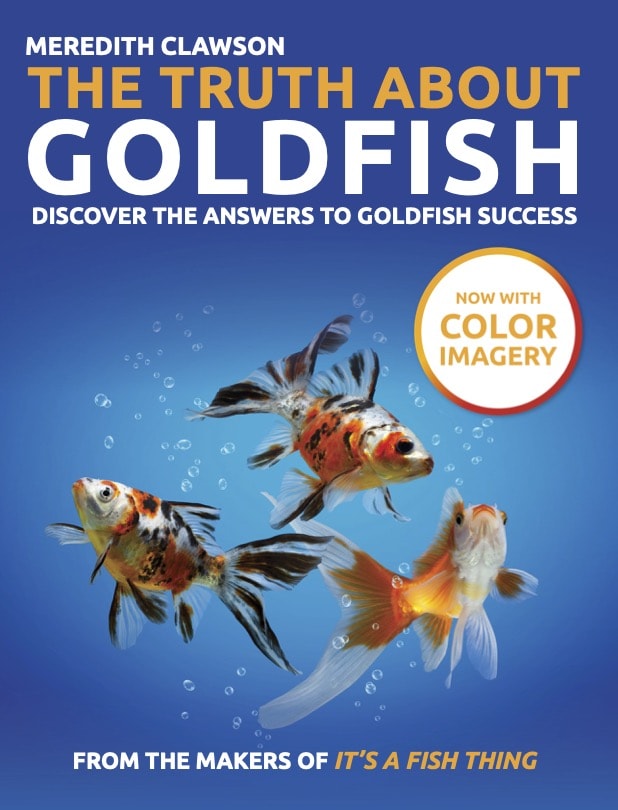
It covers all you need to know about the ideal tank setup, tank size, substrate, ornaments, plants, and so much more!
Temperature
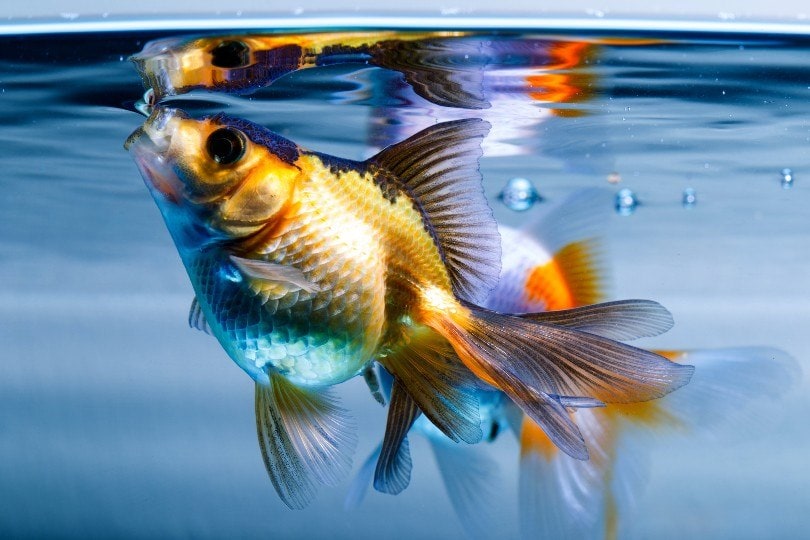
The essential thing for goldfish is a consistent temperature in the tank. Remember that in the wild, things would stay status quo in large bodies of water. Your job is to replicate those conditions with your aquarium. The size heater depends on the tank capacity and the ambient temperature of the room in which you keep it. Let’s use our 20-gallon aquarium as an example.
Let’s say you keep the room at about 68℉. You want to warm the water to about 72℉ for goldfish. That means heating it 4℉. Taking into account these figures, you’d need about a 50-watt heater to do the job. That will give you some wiggle room, too, in case you want it cooler at night.
Overcrowding
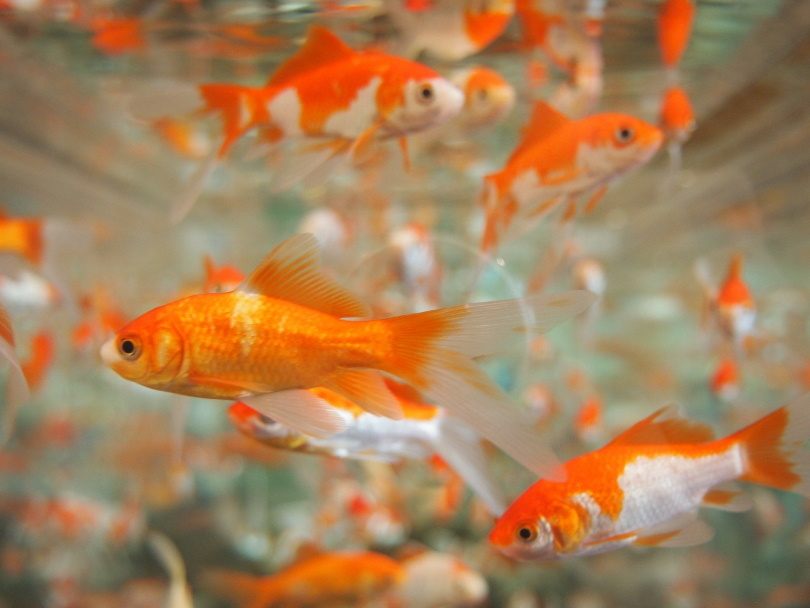
Goldfish are like many other species that prefer company in their tank. That’s another factor to remember when choosing the aquarium size. We suggest doing the math and plan first. A filled 20-gallon tank with water, gravel, and decor is going to weigh 225 pounds or more. And once you’ve set it up, it’s likely to become a permanent feature in that room.
If you want a tank full of fish, you’re going to need a bigger aquarium. Remember what we said earlier about how messy goldfish are. More fish equals more maintenance.
Water Quality
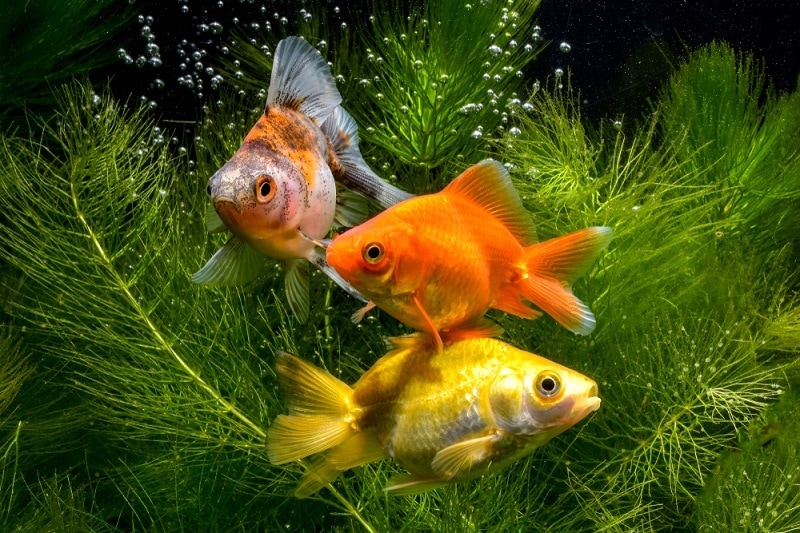
Water quality can have a significant influence on the health of your goldfish. It’s the reason you’re doing the monthly water changes to get rid of the built-up waste. A power filter is a worthwhile investment to keep the conditions stable and clean. The other thing you have to consider is the water chemistry.
We recommend testing your tank for ammonia, nitrites, nitrates, and pH at least every 2 weeks. The breakdown of waste releases some of these chemical compounds that are toxic to fish and plants. Replacing 25% of your water every 2 weeks will help prevent them from getting to dangerous levels.

How to Make My Goldfish Grow Faster
Doing everything we suggested above will put you on the path to larger goldfish. Adequate nutrition that includes the recommended amount of protein and fat will support fast growth. Providing juveniles with a variety of meat-based foods will go a long way toward this goal. However, that doesn’t mean you should overfeed them.
Uneaten food will decay and convert into the same toxins we mentioned with water quality. You should only feed your goldfish the amount that you see them consume in a few minutes. The chances are they won’t find the pellets that end up in the gravel. Also, remember that genetics also has a say in how quickly things happen.
How Big Do Outdoor Goldfish Grow?
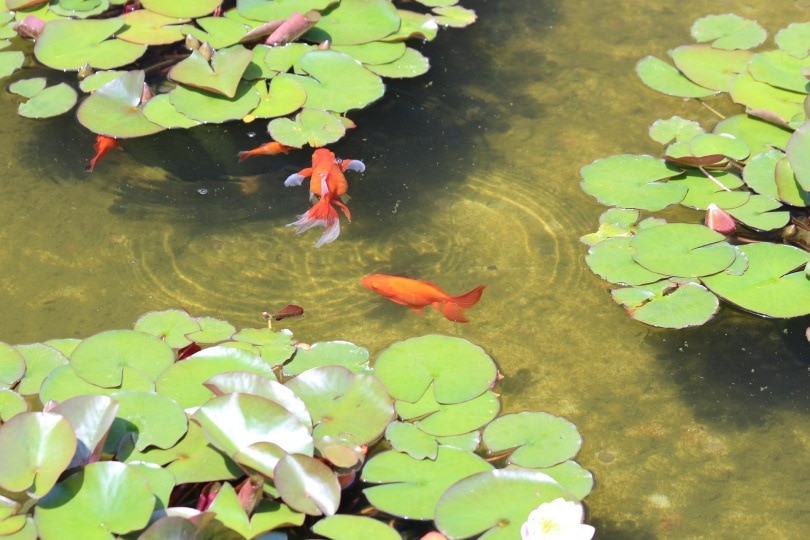
Outdoor goldfish in ponds can get substantially larger simply because they have room to grow. The record for the largest pet is 15 inches. However, the right conditions still matter, even if you keep them in a larger setup in your backyard. The other thing to remember is that they’ll need someplace to go during the winter. That means another aquarium in the house to keep them until spring.

Conclusion
Goldfish are an excellent choice for a first pet for your kids or an experienced hobbyist. Keeping the tank conditions stable with the water chemistry at safe levels is the best way to ensure that your fish will live its 10–20 years lifespan. Fortunately, they are hardy animals that can handle stress well with the right nutritional support.
Related Read: 10 Best Online Vendors for Goldfish in 2021 – Reviews & Top Picks
Featured Image Credit: hineck_Pixabay



Không có nhận xét nào